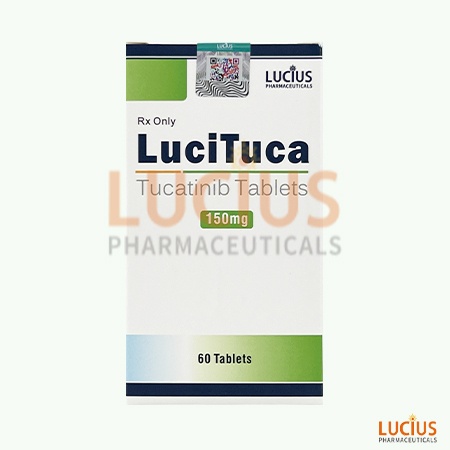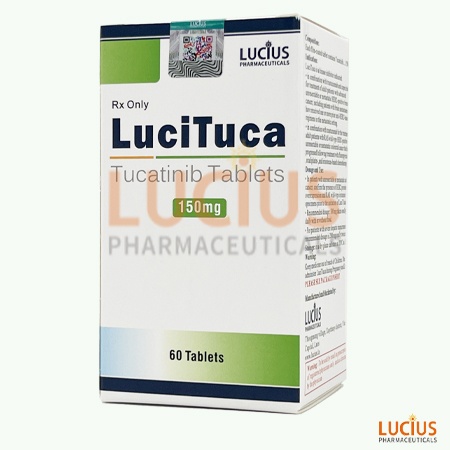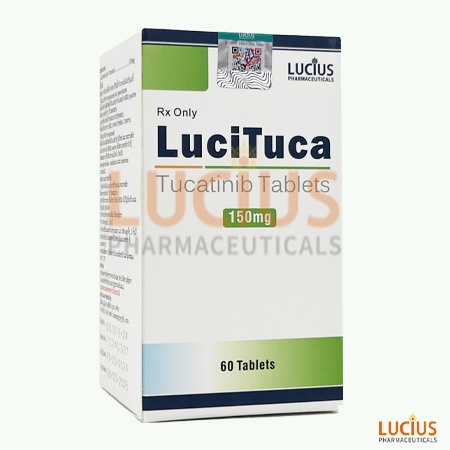





Another NameTUKYSA、Tucaxen、妥卡替尼、图卡替尼
IndicationsTucatinib can be used to treat breast cancer and colorectal cancer in adult patients.
Reg No.03 L 1079/24
Inspection NO.0557-24


Tucatinib was initially developed by Array BioPharma (now a subsidiary of Pfizer), and later the research and development work was taken over by Seattle Genetics.
On April 17, 2020, FDA approved Tucatinib for the treatment of adult patients with breast cancer, and on January 19, 2023, FDA approved Tucatinib for the treatment of adult patients with colorectal cancer (CRC).
Tucatinib has shown excellent performance in clinical applications, with high targeting selectivity towards HER2 and the ability to inhibit the growth of HER2 overexpressing tumor cells.
Tucatinib
Tucatinib can be used to treat breast cancer and colorectal cancer in adult patients.
Based on findings in animals and its mechanism of action, Tucatinib can cause fetal harm when administered to a pregnant woman. There are no available human data on Tucatinib use in pregnant women to inform a drug-associated risk. In animal reproduction studies, administration of tucatinib to pregnant rats and rabbits during organogenesis resulted in embryo-fetal mortality, reduced fetal weight and fetal abnormalities at maternal exposures ≥ 1.3 times the human exposure (AUC) at the recommended dose. Advise pregnant women and females of reproductive potential of the potential risk to the fetus.
There are no data on the presence of tucatinib or its metabolites in human or animal milk or its effects on the breastfed child or on milk production. Because of the potential for serious adverse reactions in a breastfed child, advise women not to breastfeed during treatment with Tucatinib and for 1 week after the last dose.
Tucatinib can cause fetal harm when administered to a pregnant woman. Tucatinib is used in combination with trastuzumab and capecitabine. Refer to the Full Prescribing Information of trastuzumab and capecitabine for contraception and infertility information.
Pregnancy Testing
Verify the pregnancy status of females of reproductive potential prior to initiating treatment with Tucatinib.
Contraception
Females
Advise females of reproductive potential to use effective contraception during treatment with Tucatinib and for 1 week after the last dose.
Males
Advise male patients with female partners of reproductive potential to use effective contraception during treatment with Tucatinib and for 1 week after the last dose.
Infertility
Based on findings from animal studies, Tucatinib may impair male and female fertility.
The safety and effectiveness of Tucatinib in pediatric patients have not been established.
In HER2CLIMB, 82 patients who received Tucatinib were ≥ 65 years, of whom 8 patients were ≥ 75 years. The incidence of serious adverse reactions in those receiving Tucatinib was 34% in patients ≥ 65 years compared to 24% in patients <65 years. The most frequent serious adverse reactions in patients ≥65 years who received Tucatinib were diarrhea (9%), vomiting (6%), and nausea (5%). There were no observed overall differences in the effectiveness of Tucatinib in patients ≥ 65 years compared to younger patients. There were too few patients ≥75 years to assess differences in effectiveness or safety.
In MOUNTAINEER, 12 patients were ≥65 years of age. There were too few patients ≥65 years to assess differences in effectiveness or safety.
The use of Tucatinib in combination with capecitabine and trastuzumab is not recommended in patients with severe renal impairment (creatinine clearance [CLcr]: < 30 mL/min estimated by Cockcroft-Gault Equation), because capecitabine is contraindicated in patients with severe renal impairment. Refer to the Full Prescribing Information of capecitabine for additional information in severe renal impairment.
No dose adjustment is recommended for patients with mild or moderate renal impairment (CLcr: 30 to 89 mL/min).
Tucatinib exposure is increased in patients with severe hepatic impairment (Child-Pugh C). Reduce the dose of Tucatinib for patients with severe (Child-Pugh C) hepatic impairment.
No dose adjustment for Tucatinib is required for patients with mild (Child-Pugh A) or moderate (Child-Pugh B) hepatic impairment.
Drug overdose is not yet clear.
Store at 20℃ to 25℃ (68℉to 77℉). Excursions permitted from 15℃ to 30℃(59℉ to 86℉).
The median time to peak plasma concentration of tucatinib was approximately 2 hours (range 1 to 4 hours).
from FDA,2023.01